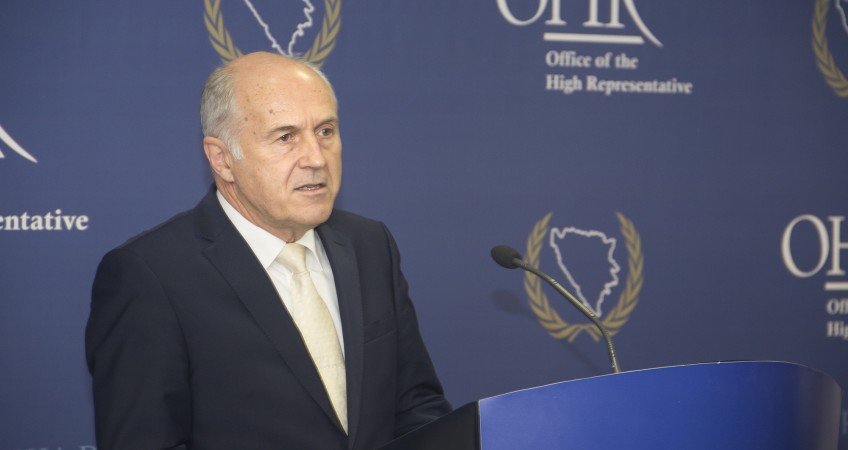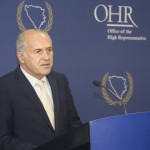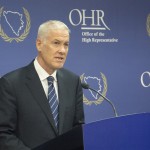High Representative Valentin Inzko
Ladies and gentlemen,
Good afternoon and welcome to today’s press conference following the two-day session of the political directors of the PIC Steering Board. Maybe this conference is a little bit late, but we had another meeting at two o’clock. Today we had the drafting of the Communique which was the fastest ever. We finished exactly at 12 o’clock.
My Principal Deputy and Brcko Supervisor Michael Scanlan and I will brief you on the discussions that we had over the last two days and conclusions of our session that you will find in the communique.
As always, the Communique of the PIC Steering Board will be distributed to you after this press conference. It will also be available on the OHR’s web page.
During the first day of our meeting, we had two thematic sessions. The first one we dedicated to local level developments which, unfortunately, tend to be neglected due to the fact that bigger events and developments attract the most attention. We decided to invite local leaders to take part in our meeting, as they are the ones who live and work amongst their constituencies.
We spoke with mayors of several towns and municipalities as well as with Heads of the Federation and Republika Srpska Unions of Municipalities and Cities.
The mayors of Tesanj, Teslic, Gradacac, Gradiska, and Tomislavgrad have informed political directors of the situation in their local communities, how they benefit their communities and their views on how to ensure continued progress on the ground.
What we have heard from them made us even more convinced that local self-government can be the driving force of progress that may also trigger positive changes at the upper level of Government. Enhanced cooperation and coordination, accelerated implementation of reforms and service in the best public interest are the ingredients to success.
We really heard good stories, and also interreligious stories. Such as Tomislavgrad, the Orthodox Chapels, Orthodox Churches. A Bosniak has repaired a Catholic church in Tešanj, etc. And, of course, of fantastic exports – over 200 million KM from some municipalities like Tešanj or Gradačac.
Good stories, but also bad details. For example, Tešanj has not been able to get an electrical substation for four years now. Because they are using 95% of their electricity now, they cannot have new companies and new developments, or enlargement of companies, as there is no electricity left. And there have been four years now, with them waiting for an electrical substation. But, basically, all these mayors have reported in a positive sense. Including Tomislavgrad – a detail which I did not know – it now has more population and more jobs than before 1991. This is very interesting and encouraging.
Earlier, there was also a meeting, outside the PIC, of female mayors at the German residence. Also a very interesting group in BiH. But, of course, too few. As you know, your own laws foresee 40% of women in development, as well as in government and executive functions.
Being aware of the situation on the ground, the second session of the PIC SB political directors was dedicated to the migrant issue and the operational response at the state level.
To cover all the aspects, we spoke with the experts, Peter Van der Auweraert, IOM Coordinator for the West Balkans, Zoran Galic, Director of the BiH Border Police and Slobodan Ujic, Director of the BiH Service for Foreigners’ Affairs.
Some of the information was quite shocking. For example, Mr. Galic cannot fill 500 open posts for the Border Police, so you have one border policeman every 20-22 kilometers. How can they control the border? This, of course, is also a budgetary issue, which we also discussed, the State budget.
Mr. Ujic informed us how foreigners are being treated. Sometimes the offices of the Service for Foreigners are located in city centers, like in Tuzla, and it is not always easy to handle 100-200 per day in the center of the city.
In any case, this meeting was very interesting and partly depressing. But it also shows that the entire country is responsible for migrant issues. This is an original Dayton issue – migrations and asylum – and it is a state competence. It is not only the duty of one entity or of one canton.
And yet, the burden of the problem and the challenges it poses are disproportionally shared. The RS and other cantons besides Una-Sana need to do more. The RS needs to participate in addressing issues that affect the entire country.
Speaking about Serbs, it is no secret that the biggest group in Vienna, other than Austrians, are Serbs. They have been nicely received. Some have been received as workers, others as refugees. But in any case, I think Serbs also got a lot of positive attention in many countries in the world. And it is my personal view that they should also reciprocate when they have refugees in their own regions, who are basically transit refugees. They will not stay in Republika Srpska or Una-Sana Canton, or Sarajevo, or Salakovac, etc.
Another takeaway from this discussion is that the State-level institutions need more financial resources to be able to tackle the migration flow more efficiently and effectively.
As you know, the budget has been frozen for seven years – since 2012. In 2012 there was no migrant crisis. And we heard from the Italian delegate today that in Italy the budget for the migrant crisis exploded because of so many migrants. But also here, this issue was not present in 2012 and it would be only logical to have an increase in the budget which has been frozen since 2012.
It is important to find a path forward for the BiH state to more effectively execute its constitutional competencies and responsibilities for migration-related issues in close cooperation with other levels of government. Sufficient budget should be provided to help the state agencies to improve their effectiveness in addressing migration-related problems.
It is, of course, nice and we are proud that the International Community is basically financing all the refugee centers around BiH. But can you imagine what would happen if the EU would not give 32 million, or whatever, euros for the migrant crisis? It is the local responsibility and not of the international community.
Now, before I give the floor to my Principal Deputy and Brcko Supervisor, Michael Scanlan who will inform you about today’s part of the session of the PIC Steering Board political directors, I want to draw your attention to a sad anniversary that we are approaching.
This December will mark 10 years – a whole decade! – since the ECtHR passed a decision in Sejdic/Finci case. But, of course, more decisions followed later – Pilav, Zornic, etc.
Year after year, BiH authorities fail to implement the European Court of Human Rights’ rulings in the Sejci-Finci case.
Year after year, BiH treats some citizens as less equal than others and this discrimination must come to an end. The PIC SB urged BiH political and institutional leaders to implement this decision as well. As you know, this is not only about Mr. Sejdic and Mr. Finci. This is also about the Serbs in Sarajevo, Serbs in the Federation. This is about the Croats and Bosniaks in Republika Srpska who cannot be part of the House of Peoples at the State level. They cannot be candidates for the State Presidency. So this is a huge part of the population. The groups which I mentioned now – and of course all the 16 minorities in this country and the people from so-called mixed marriages – they are not equal in this country. And it is high time that we do something about it. Ten years have passed. This is actually not tolerable, that you live in a country where there is no égalité.
Principal Deputy High Representative
Thank you, High Representative,
To start off with, let me say the PIC SB welcomed the nomination of the new Chair of the BiH Council of Ministers, along with the decision adopted by the BiH Presidency regarding the submission of the Program of Reforms of Bosnia and Herzegovina to NATO
The expectation now of the PIC SB is that the formation of the BiH Council of Ministers will be concluded, and the BiH Parliamentary Assembly will begin working on implementing reforms in an accelerated manner.
At the same time, we encourage the formation of authorities at the Federation and cantonal level to be completed without further delay.
Today at the PIC the focus was on the functioning of state institutions and the challenges to the implementation of the Dayton Peace Agreement.
When it comes to the functionality of the state-level institutions, the PIC SB is of the opinion that their functionality should be enhanced, not undermined.
The BiH budget for State institutions, as the High Representative has mentioned, has been frozen now for 7 years at 950 million KM, which signals a de facto annual decrease in the budget. This limits the scope of activity and the capacity of the State to function in line with its constitutional and legal obligations. Something heard through the panels on the first day. This has far-reaching consequences for the citizens of BiH.
Therefore the PIC Steering Board urged for the prompt adoption of the state-level budget which would meet the needs of state-level institutions.
The view of the PIC SB is that the interest of all levels of government is best served not by rolling-back essential reforms, but by implementing forward-looking reforms that support and strengthen the security, stability, and prosperity of BiH, and promote local ownership.
In this respect, the PIC SB recalled its statement of 13 November concerning the Conclusions adopted by the RSNA.
The PIC SB also underscored that the conclusion seeking to criminalize violations of the RSNA’s positions would violate basic standards of democracy by exerting extreme pressure on officials from the territory of the RS. This would constitute a direct attack on the autonomy and independence of state-level officials, in violation of the Constitution of BiH.
In the Communique, the PIC SB also urges the relevant levels of authority to enable citizens of Mostar to vote in the 2020 local elections by resolving the electoral impasse in Mostar through a political process not contingent on other electoral matters and by doing so, implement the October 29th decision of the European Court on Human Rights in the case of Baralija vs BiH.
On this front, you probably have already seen a joint statement issued following this afternoon’s meeting, which the High Representative attended and referenced, of representatives of the International Community with presidents of SDA and HDZ BiH on this subject.
The PIC Communique language and the joint statement clearly state our position on the Mostar issue.
Ladies and gentlemen,
Before we move to your questions, I also need to tell you that the Russian Federation disagreed with the Communique and asked for it to be footnoted as such. As before, we will not go into details of that decision. Should you have any questions about it, I am sure that the representatives of the Russian Federation will provide you with answers.
Thank you. The High Representative and I will now take your questions.














